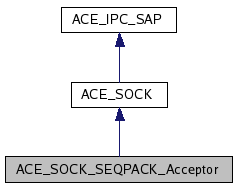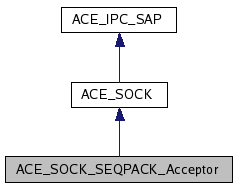ACE_SOCK_SEQPACK_Acceptor Class Reference
Defines a factory that creates new ACE_Associations passively. More...
#include <SOCK_SEQPACK_Acceptor.h>


Public Types | |
| typedef ACE_Multihomed_INET_Addr | PEER_ADDR |
| typedef ACE_SOCK_SEQPACK_Association | PEER_STREAM |
Public Member Functions | |
| ACE_SOCK_SEQPACK_Acceptor (void) | |
| Default constructor. | |
| ACE_SOCK_SEQPACK_Acceptor (const ACE_Addr &local_sap, int reuse_addr=0, int protocol_family=PF_UNSPEC, int backlog=ACE_DEFAULT_BACKLOG, int protocol=132) | |
| ACE_SOCK_SEQPACK_Acceptor (const ACE_Multihomed_INET_Addr &local_sap, int reuse_addr=0, int protocol_family=PF_UNSPEC, int backlog=ACE_DEFAULT_BACKLOG, int protocol=132) | |
| Multihomed version of same. | |
| ACE_SOCK_SEQPACK_Acceptor (const ACE_Addr &local_sap, ACE_Protocol_Info *protocolinfo, ACE_SOCK_GROUP g, u_long flags, int reuse_addr, int protocol_family=PF_UNSPEC, int backlog=ACE_DEFAULT_BACKLOG, int protocol=132) | |
| int | open (const ACE_Addr &local_sap, int reuse_addr=0, int protocol_family=PF_UNSPEC, int backlog=ACE_DEFAULT_BACKLOG, int protocol=132) |
| int | open (const ACE_Multihomed_INET_Addr &local_sap, int reuse_addr=0, int protocol_family=PF_UNSPEC, int backlog=ACE_DEFAULT_BACKLOG, int protocol=132) |
| Multihomed version of same. | |
| int | open (const ACE_Addr &local_sap, ACE_Protocol_Info *protocolinfo, ACE_SOCK_GROUP g, u_long flags, int reuse_addr, int protocol_family=PF_UNSPEC, int backlog=ACE_DEFAULT_BACKLOG, int protocol=132) |
| int | close (void) |
| Close the socket. Returns 0 on success and -1 on failure. | |
| ~ACE_SOCK_SEQPACK_Acceptor (void) | |
| Default dtor. | |
| int | accept (ACE_SOCK_SEQPACK_Association &new_association, ACE_Addr *remote_addr=0, ACE_Time_Value *timeout=0, bool restart=true, bool reset_new_handle=false) const |
| void | dump (void) const |
| Dump the state of an object. | |
Public Attributes | |
| ACE_ALLOC_HOOK_DECLARE | |
| Declare the dynamic allocation hooks. | |
Protected Member Functions | |
| int | shared_accept_start (ACE_Time_Value *timeout, bool restart, int &in_blocking_mode) const |
| int | shared_accept_finish (ACE_SOCK_SEQPACK_Association new_association, int in_blocking_mode, bool reset_new_handle) const |
| int | shared_open (const ACE_Addr &local_sap, int protocol_family, int backlog) |
| int | shared_open (const ACE_Multihomed_INET_Addr &local_sap, int protocol_family, int backlog) |
| Multihomed version of same. | |
Private Member Functions | |
| int | get_remote_addr (ACE_Addr &) const |
| Do not allow this function to percolate up to this interface... | |
Detailed Description
Defines a factory that creates new ACE_Associations passively.The <ACE_SOCK_SEQPACK_Acceptor> has its own "passive-mode" socket. This serves as a factory to create so-called "data-mode" sockets, which are what the ACE_SOCK_SEQPACK_Association encapsulates. Therefore, by inheriting from <ACE_SOCK>, <ACE_SOCK_SEQPACK_Acceptor> gets its very own socket.
Member Typedef Documentation
Constructor & Destructor Documentation
| ACE_BEGIN_VERSIONED_NAMESPACE_DECL ACE_SOCK_SEQPACK_Acceptor::ACE_SOCK_SEQPACK_Acceptor | ( | void | ) |
Default constructor.
| ACE_SOCK_SEQPACK_Acceptor::ACE_SOCK_SEQPACK_Acceptor | ( | const ACE_Addr & | local_sap, | |
| int | reuse_addr = 0, |
|||
| int | protocol_family = PF_UNSPEC, |
|||
| int | backlog = ACE_DEFAULT_BACKLOG, |
|||
| int | protocol = 132 | |||
| ) |
Initialize a passive-mode BSD-style acceptor socket (no QoS). local_sap is the address that we're going to listen for connections on. If reuse_addr is 1 then we'll use the SO_REUSEADDR to reuse this address.
| ACE_SOCK_SEQPACK_Acceptor::ACE_SOCK_SEQPACK_Acceptor | ( | const ACE_Multihomed_INET_Addr & | local_sap, | |
| int | reuse_addr = 0, |
|||
| int | protocol_family = PF_UNSPEC, |
|||
| int | backlog = ACE_DEFAULT_BACKLOG, |
|||
| int | protocol = 132 | |||
| ) |
Multihomed version of same.
| ACE_SOCK_SEQPACK_Acceptor::ACE_SOCK_SEQPACK_Acceptor | ( | const ACE_Addr & | local_sap, | |
| ACE_Protocol_Info * | protocolinfo, | |||
| ACE_SOCK_GROUP | g, | |||
| u_long | flags, | |||
| int | reuse_addr, | |||
| int | protocol_family = PF_UNSPEC, |
|||
| int | backlog = ACE_DEFAULT_BACKLOG, |
|||
| int | protocol = 132 | |||
| ) |
Initialize a passive-mode QoS-enabled acceptor socket. Returns 0 on success and -1 on failure.
| ACE_BEGIN_VERSIONED_NAMESPACE_DECL ACE_INLINE ACE_SOCK_SEQPACK_Acceptor::~ACE_SOCK_SEQPACK_Acceptor | ( | void | ) |
Default dtor.
Member Function Documentation
| int ACE_SOCK_SEQPACK_Acceptor::open | ( | const ACE_Addr & | local_sap, | |
| int | reuse_addr = 0, |
|||
| int | protocol_family = PF_UNSPEC, |
|||
| int | backlog = ACE_DEFAULT_BACKLOG, |
|||
| int | protocol = 132 | |||
| ) |
Initialize a passive-mode BSD-style acceptor socket (no QoS). local_sap is the address that we're going to listen for connections on. If reuse_addr is 1 then we'll use the SO_REUSEADDR to reuse this address. Returns 0 on success and -1 on failure.
| int ACE_SOCK_SEQPACK_Acceptor::open | ( | const ACE_Multihomed_INET_Addr & | local_sap, | |
| int | reuse_addr = 0, |
|||
| int | protocol_family = PF_UNSPEC, |
|||
| int | backlog = ACE_DEFAULT_BACKLOG, |
|||
| int | protocol = 132 | |||
| ) |
Multihomed version of same.
| int ACE_SOCK_SEQPACK_Acceptor::open | ( | const ACE_Addr & | local_sap, | |
| ACE_Protocol_Info * | protocolinfo, | |||
| ACE_SOCK_GROUP | g, | |||
| u_long | flags, | |||
| int | reuse_addr, | |||
| int | protocol_family = PF_UNSPEC, |
|||
| int | backlog = ACE_DEFAULT_BACKLOG, |
|||
| int | protocol = 132 | |||
| ) |
Initialize a passive-mode QoS-enabled acceptor socket. Returns 0 on success and -1 on failure.
| int ACE_SOCK_SEQPACK_Acceptor::close | ( | void | ) |
| int ACE_SOCK_SEQPACK_Acceptor::accept | ( | ACE_SOCK_SEQPACK_Association & | new_association, | |
| ACE_Addr * | remote_addr = 0, |
|||
| ACE_Time_Value * | timeout = 0, |
|||
| bool | restart = true, |
|||
| bool | reset_new_handle = false | |||
| ) | const |
Accept a new ACE_SOCK_SEQPACK_Association connection. A timeout of 0 means block forever, a timeout of {0, 0} means poll. <restart> == 1 means "restart if interrupted," i.e., if errno == EINTR. Note that <new_association> inherits the "blocking mode" of this <ACE_SOCK_SEQPACK_Acceptor>, i.e., if this acceptor factory is in non-blocking mode, the <net_association> will be in non-blocking mode and vice versa.
| void ACE_SOCK_SEQPACK_Acceptor::dump | ( | void | ) | const |
| int ACE_SOCK_SEQPACK_Acceptor::shared_accept_start | ( | ACE_Time_Value * | timeout, | |
| bool | restart, | |||
| int & | in_blocking_mode | |||
| ) | const [protected] |
Perform operations that must occur before <ACE_OS::accept> is called.
| int ACE_SOCK_SEQPACK_Acceptor::shared_accept_finish | ( | ACE_SOCK_SEQPACK_Association | new_association, | |
| int | in_blocking_mode, | |||
| bool | reset_new_handle | |||
| ) | const [protected] |
Perform operations that must occur after <ACE_OS::accept> is called.
| int ACE_SOCK_SEQPACK_Acceptor::shared_open | ( | const ACE_Addr & | local_sap, | |
| int | protocol_family, | |||
| int | backlog | |||
| ) | [protected] |
This method factors out the common <open> code and is called by both the QoS-enabled <open> method and the BSD-style <open> method.
| int ACE_SOCK_SEQPACK_Acceptor::shared_open | ( | const ACE_Multihomed_INET_Addr & | local_sap, | |
| int | protocol_family, | |||
| int | backlog | |||
| ) | [protected] |
Multihomed version of same.
| int ACE_SOCK_SEQPACK_Acceptor::get_remote_addr | ( | ACE_Addr & | ) | const [private] |
Member Data Documentation
The documentation for this class was generated from the following files:
 1.5.6
1.5.6